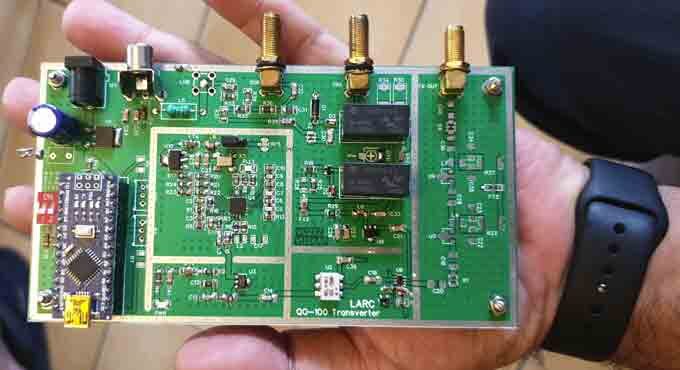A group of Radio Amateurs in the city are literally making waves after they succeeded in indigenously designing and testing low-cost equipment that could help the Hams communicate via QO-100 geo-synchronous satellite.
In what is certain to be a gamechanger for radio amateur community, five Hyderabad-based Ham operators have made prototypes of down and up convertors for the QO-100 satellite. Use of this equipment, would enable any Ham operator in practicing satellite communication, which hitherto would have forced them to invest heavy amounts.
Normally, one needs to use the Software Defined Radio (SDR) receiver just to listen to the conversations happening on the satellite or use a transceiver to communicate. These receivers or transceivers are expensive and the branded equipment could cost more than a lakh. The Hyderabad team of Ham operators, adept in homebrewing have designed a functional down converter, an up converter and successfully used them for having QSOs (conversations) with other Hams.
Radio amateurs are to connect their licensed radio sets to the newly fabricated converters to use the transponders on the QO-100.
The whole operation would be something akin to DTH set top box which we use at homes. A satellite beams TV programme signals, which are tapped by a dish on rooftops. This dish fitted with an LNB converts these radio waves into signals, received by the set top box through a cable. The settop box again converts them into visuals on TV. In the same fashion, the QO-100 too has a 10 Giga Hertz downlink and 2.4 Giga Hertz uplink frequencies.
For the indigenously developed converters, the Hyderabad Ham team sourced locally available 95 cm dish (costing about Rs 1500) and LNB (Rs 150) to receive QO-100 signals. The real success was in designing the circuit board which could receive signals from the dish (10 Ghz) and convert them into 740 Mega Hertz (Inermediate Frequency in tech lingo).
“Designing this circuit board took nearly one year and it is working wonderfully”, narrate a visibly elated Sasi Bhushan, VU2XZ and A Amarendra, VU2AAP. The two homebrewers have sourced electronic components from India and other countries to fabricate the circuit boards, which work as downlink converter and the uplink converter. The uplink converter transforms the waves into 2.4 Giga Hertz frequency and shoots them through the same dish to the QO-100 satellite.
The Hyderabad Ham operators plan to release the downlink and uplink converters for use by the radio amateurs based in Hydeabad first. “Our aim is to make the converters available at cheap prices for the members of the Lamakan Amateur Radio Club (LARC)”, says Sasi Bhushan. Plans are also afoot to design a transverter – a combination of downlink and uplink converters so that any ham operator could use it directly.
Otherwise, those interested only in listening to the radio communication via QO-100 could use only the downlink converter, while those planning to have QSOs (coversation) via satellite could use the uplink converter as of now. “The prototype of the transverter is ready. It would be a plug-and-play transverter”, asserts Sasi. If Sasi Bhushan and Amarendra spent considerable time in designing them, fellow Hams B. Venu Gopal VU2BVB, Anil VU3DXA, K Nagasainath VU2TJF and MVS Sarma VU3ZMV helped in sourcing material, fabricating and testing the converters.
Source: telanganatoday.com

